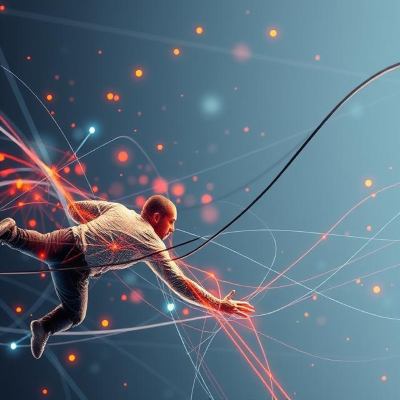
Human history has always been a story of reaching further, doing more, and finding new ways to make life better. From the first plows to the internet, each leap in productivity has reshaped how we live and think. Today, artificial intelligence (AI) stands as the newest leap, offering capabilities that were once the realm of science fiction. But it also raises a deep question: is there a limit to how much we can achieve, or will our aspirations keep expanding? When we look at areas like healthcare, food, and the pursuit of experiences, it becomes clear that human desire doesn’t have a ceiling—it evolves, constantly opening new horizons for creativity and productivity.
Health is one of the clearest examples of where our drive to improve seems endless. Research shows that as societies grow wealthier, people tend to spend more on health, not just for survival but for better quality of life. We aspire to live longer, prevent disease, and maintain vitality. Our ambitions shift as we progress.
Even as medicine solves old problems, new opportunities emerge. Understanding genetics, monitoring health through wearables and imaging, developing new drugs, and applying personalized medicine all push the boundaries of what’s possible. Continuous surveillance of vital and metabolic systems allows us to detect and prevent issues long before they become serious. Each advance directly enhances lifespan and well-being. In essence, we can never be to be healthy, and medical productivity does not have an upper limit. AI could potentially reduce costs but never the demand for productivity and progress.
AI is already transforming healthcare in ways that make life better for both patients and professionals. Algorithms can read medical images, automate administrative work, and accelerate drug research. But these innovations don’t remove the human touch—they free doctors and nurses to focus on complex diagnoses, empathy, and personalized treatment. Productivity grows, and humans find more meaningful work in the process.
Food is an essential commodity but unlike health, the amount of food we need is limited by our bodies. But the experience of eating is boundless. Once our caloric needs are met, the focus shifts from quantity to quality, variety, and enjoyment. The modern food economy thrives on creativity and novelty—from artisanal dishes to innovative culinary experiences. As Thorstein Veblen observed, consumption often expresses identity and social meaning.
AI may play a role here too. Machine learning helps personalize diets, manage supply chains for rare ingredients, and even experiment with new flavor combinations. While we can only eat so much, the ways we experience food are practically limitless. Productivity in this sense isn’t about volume—it’s about enriching lives through taste, culture, and creativity.
Ideally, the rewards of greater productivity wouldn’t stop at our borders; we should ensure they reach those who need them most. That would be the humane thing do.
AI can do amazing things: analyze mountains of data, optimize processes, and suggest solutions we might not see. But human creativity remains at the heart of meaningful innovation. We decide which problems matter, interpret ambiguous situations, and imagine possibilities that machines cannot conceive on their own. AI extends our reach, allowing us to explore more ideas and create more nuanced, thoughtful outcomes.
From art to medicine, the best results come from this partnership. AI can propose patterns, generate options, or optimize tasks, but humans bring context, judgment, and moral reasoning. Together, we turn raw productivity into something richer—solutions that resonate, inspire, and adapt to real human needs.
In developed societies, most basic needs are met. People don’t worry about food or shelter as much as they once did; now the economy thrives on luxury, experiences, and personal expression. The COVID-19 pandemic highlighted this: essential goods continued flowing, but luxury sectors—travel, fashion, hospitality—took the hardest hit. This shows that much of our economic energy now focuses on non-essentials.
This aligns with the idea of the Veblen good, where demand grows with price because consuming it signals status. AI can amplify this trend, helping to produce tailored art, fashion, and experiences. Human creativity directs this output, ensuring that technology serves culture and meaning, not just efficiency.
There’s a common fear that AI will destroy jobs. History suggests otherwise. Past revolutions didn’t just eliminate roles—they created new ones. Blacksmiths gave way to mechanics, traffic engineers, and designers. Likewise, AI expands opportunities for human work, generating demand for creators, interpreters, ethicists, and experience designers. Productivity doesn’t shrink the human role; it transforms it.
Of course, there are physical limits: finite energy, materials, and time. But the human appetite for achievement keeps pushing forward. The Baumol effect shows that sectors like health and education, even with AI efficiency gains, continue to need human labor to achieve meaningful impact.
Education offers a clear example. AI platforms can personalize learning, provide adaptive tutoring, and democratize knowledge, but teachers become mentors and guides rather than mere dispensers of information. Every efficiency gain frees humans to create, imagine, and connect. The frontier of value expands endlessly, from material abundance to beauty, meaning, and human expression.
So where does this leave us? From what I can see, we're not approaching some productivity ceiling. If anything, we're discovering that human ambition is the ultimate renewable resource.
Healthcare shows us that better just leads to wanting even better. Food consumption demonstrates that satisfaction comes from quality, not just quantity. And our love for luxury and experiences reveals that once our basic needs are met, we start building cathedrals of meaning and identity.
The most encouraging thing is that AI isn't replacing us—it's giving us better tools to create, to connect, to care, to understand. The work ahead isn't about competing with machines; it's about realising our imagination.